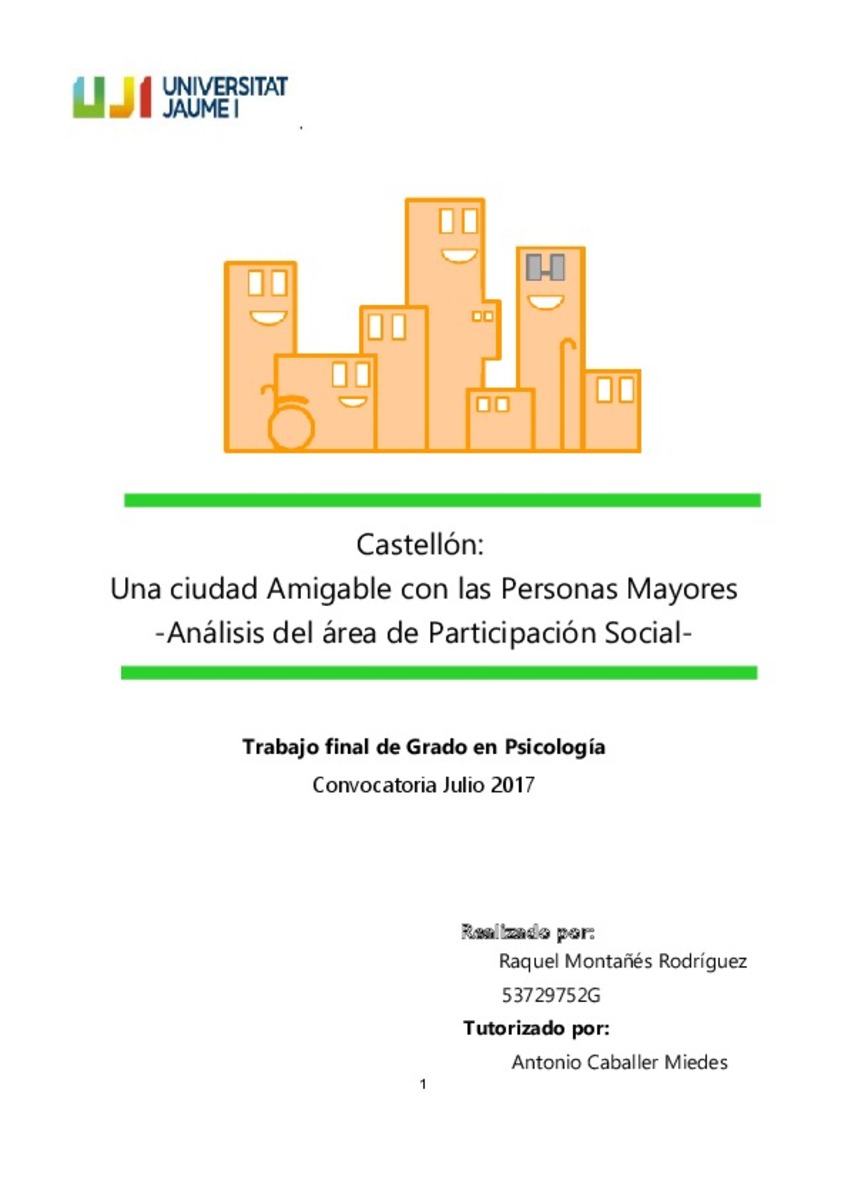Mostrar el registro sencillo del ítem
Castellón: una ciudad amigable con las personas mayores. Análisis del área de Participación Social
| dc.contributor.author | Montañés Rodríguez, Raquel | |
| dc.contributor.other | Caballer Miedes, Antonio | |
| dc.contributor.other | Universitat Jaume I. Departament de Psicologia Evolutiva, Educativa, Social i Metodologia | |
| dc.date.accessioned | 2017-09-28T10:12:50Z | |
| dc.date.available | 2017-09-28T10:12:50Z | |
| dc.date.issued | 2017 | |
| dc.identifier.uri | http://hdl.handle.net/10234/169038 | |
| dc.description | Treball Final de Grau. Grau en Psicologia. Codi: PS1048. Curs acadèmic 2016/2017 | ca_CA |
| dc.description.abstract | La organización mundial de la salud (OMS), en base a las tendencias demográficas actuales estableció el proyecto de la Red mundial de Ciudades Amigables con las Personas Mayores. El objetivo del presente estudio es evaluar el grado de participación social de las Personas Mayores de la ciudad de Castellón, mediante el Protocolo Vancouver, y la administración de una encuesta diseñada por la Universitat Jaume I, donde la participación social se evaluó a través de 5 ítems de tipo Likert. La encuesta presenta un nivel de confianza de 95,5%, un error de ± 7 para el conjunto de la muestra y una varianza poblacional P=Q. La selección de la muestra fue a través de un muestreo aleatorio por conglomerados (asociaciones de mayores de la ciudad) y el tamaño fue de 203 personas mayores de 60 años, 55% (112) son mujeres y 45% (91) son hombres, haciendo una media total de edad de 74,46 años (DT=7,62). Los resultados obtenidos mediante el Protocolo Vancouver muestran que las personas mayores consideran adecuadas las actividades ofrecidas por el ayuntamiento de Castellón, aunque señalan que se encuentran limitadas a la hora de participar en ellas y proponen una serie de mejoras que consideran necesarias para hacer de Castellón una ciudad amigable con las personas mayores. Por otro lado, los resultados obtenidos gracias a la encuesta, muestran que la media de participación social es de 2,99 (DT=1,03). Que significa que la mayor parte de la muestra se sitúa en un nivel de indiferencia dentro del continuo del grado de acuerdo o desacuerdo. Del mismo modo, los resultados mostraron una correlación significativa entre la participación social y la satisfacción general de ,249, pero no obtuvimos diferencias significativas en la participación social por razón de género, así como tampoco por el hecho de vivir solos o con compañía. Por ello es conveniente la elaboración de un plan de acción con el fin de mejorar la participación social actual y futura, contribuyendo a un mejor envejecimiento activo | ca_CA |
| dc.description.abstract | The world organization of the health (WHO), based on the current demographic tendencies established the project of the world Network of Friendly Cities with the Elderly. The aim of the present study, it is to assess the level of social participation of the Elderly of the city of Castellón, by means of the Protocol Vancouver, and the administration of a survey designed by Universitat Jaume I, where the social participation was evaluated across 5 items of type Likert. The survey presents a level of confidence of 95,5%, an error of ± 7 for the set of the sample and a population variance P=Q. The selection of the sample has been realized across a random sampling for conglomerates (Elderly Associations of the city) and the size belonged to 203 60-year-old elderly, 55 % (112) is women and 45 % is men, with an entire age average of 74,46 years old (DT=7,62). The results obtained by means of the Protocol Vancouver show that the elderly consider to be suitable the activities offered by the town hall of Castellón, although they point out that they are limited at the time of taking part in them and propose a serie of progress that they consider to be necessary to do of Castellón a friendly city with the elderly. On the other hand, the results obtained thanks to the survey, show that the social participation average is 2,99(DT=1,03). This means that most of the sample is located in an indifference level respect the grade of agreement or in disagreement. In the same way, the results showed a significant interrelation between the social participation and the general satisfaction of, 249, but we did not obtain significant differences in the social participation because of genere, as well as neither for the fact of living alone or with company. For that reason is suitable to make a plan of action in order to improve the current and future social participation, contributing to a better active aging. | ca_CA |
| dc.format.extent | 28 p. | ca_CA |
| dc.format.mimetype | application/pdf | ca_CA |
| dc.language.iso | spa | ca_CA |
| dc.publisher | Universitat Jaume I | ca_CA |
| dc.rights | Licencia CC-BY-SA | ca_CA |
| dc.rights | Atribución-CompartirIgual 4.0 Internacional | * |
| dc.rights.uri | http://creativecommons.org/licenses/by-sa/4.0/ | * |
| dc.subject | Grau en Psicologia | ca_CA |
| dc.subject | Grado en Psicología | ca_CA |
| dc.subject | Bachelor's Degree in Psychology | ca_CA |
| dc.subject | Envejecimiento activo | ca_CA |
| dc.subject | Ciudades amigables | ca_CA |
| dc.subject | participación social | ca_CA |
| dc.subject | encuesta personas mayores | ca_CA |
| dc.subject | Active aging | ca_CA |
| dc.subject | friendly cities | ca_CA |
| dc.subject | social participation | ca_CA |
| dc.subject | survey elderly | ca_CA |
| dc.title | Castellón: una ciudad amigable con las personas mayores. Análisis del área de Participación Social | ca_CA |
| dc.type | info:eu-repo/semantics/bachelorThesis | ca_CA |
| dc.educationLevel | Estudios de Grado | ca_CA |
| dc.rights.accessRights | info:eu-repo/semantics/openAccess | ca_CA |
Ficheros en el ítem
Este ítem aparece en la(s) siguiente(s) colección(ones)
-
Grau en Psicologia [56]
PS1048








